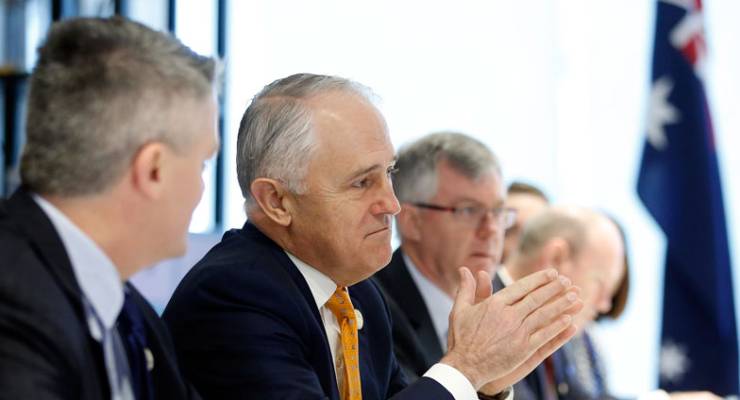
Hear the one about a free trader, the protectionist and the iron ore producer who walk into a bar? Barman says: “Hello Malcolm.” Today has furnished more evidence of how the Turnbull government tries to walk both sides of the street when it comes to protectionism.
[Government gets it part-right on submarines]
As Crikey has been banging on about for months, when it comes to steel, this notionally free trade government is protectionist as they come, endlessly boasting of how it is using anti-dumping provisions to try, Canute-like, to hold back the global tide of cheap steel that has turned the Australian-made product utterly uncompetitive. Not that we’re Robinson Crusoe in that regard — everyone is anti-dumping on everyone else as cheap steel circles the globe looking for a home. China, with massive excess steel-making capacity, is a particular target for criticism and anti-dumping actions — so much so that the issue not merely came up at the G20 but actually made it into the communique.
“We recognize that excess capacity in steel and other industries is a global issue which requires collective responses. We also recognize that subsidies and other types of support from government or government-sponsored institutions can cause market distortions and contribute to global excess capacity and therefore require attention. We commit to enhance communication and cooperation, and take effective steps to address the challenges so as to enhance market function and encourage adjustment. To this end, we call for increased information sharing and cooperation through the formation of a Global Forum on steel excess capacity, to be facilitated by the OECD with the active participation of G20 members and interested OECD members.”
And China is a particular target of Australian anti-dumping actions. Earlier this year, then-industry minister Christopher Pyne — under pressure from Labor on the fate of the Whyalla steelworks in his home state of South Australia — was boasting about going after the Chinese. “New decisions take another stand against Chinese steel dumping,” Pyne proudly announced in April, declaring that the Chinese had been busted dumping rebar and would be hit with extra duties. Pyne had ordered an urgent investigation into “Asian steel” back in February.
So you’d expect Malcolm Turnbull, at the G20, to laud this recognition that China was churning out too much cheap steel? Well, no, as it turns out, Turnbull was very understanding of China’s position. “China, its leadership, have got to manage this transition in a way that does not put millions of people out of work and create all of the social problems and injustices that that would entail,” Turnbull said, according to a Phillip Coorey report from China.
[RBA, not govt, correctly assesses real China threat]
Chinese economic difficulties, of course, are difficulties for Australia, given how dependent we are on the world’s second-largest economy. Then of course there’s the slight problem that Chinese steel is made partly from Australian iron ore. Any reduction in steel production will flow through to lower iron ore prices and lower tax revenue from BHP and Rio Tinto. And indeed, Turnbull is supposed to be a free trader — he apparently lectured other G20 leaders about protectionism, saying it “is not a ladder to get us out of the low-growth trap”.
So Turnbull’s a free trader on the world stage, but back home his government is railing at those dastardly Chinese and their cheap steel. And don’t mention the boats — the naval boats, of course. Remember Turnbull’s boast back in April (what a month that was for free trade in Australia!) about building the next generation of submarines in Australia, at a cost of tens of billions of extra taxpayer dollars, in Adelaide? “Australian built, Australian jobs, Australian steel, here right where we stand,” the Prime Minister proudly said.
Problem is, you could build not just the entire naval fleet but the entire country out of local steel and it still wouldn’t make Australian steel producers any more competitive. Lucky we’ve got a stake in all that terrible Chinese over-capacity, right?








More concerned about unemployed Chinese workers in China than Australian workers apparently.
Keep telling you Bernard, Chinese steel is shit.
>Chinese steel is shit.
I have heard that. If only Australia could have high quality manufacturing – but the demise of the car industry is substantially reducing economies of scale and in the absence of a meaningful Commonwealth policy and program there is not much hope.
Competent policies and programs take real intellect and real work. It is easier to leave it all to the market place.
Malcome/Misspent/Mistake Turnbull is empty, full of bullshit, leaves the country in the hands of man that looks like he has done 13 rounds after a bottle of rum, has no agenda, loves Chrissie Pyne and looks like he has no balls on the world stage. And thanks to the LNP we are on the IS hit list. What business is it of ours, a nation of 26 mil to fight wars in Iraq and Afghanistan. These LNP pricks are evil and here we have Howard comparing himself to Menzies at the pressclub. Did all these fools go to Clown School before politics?
The best thing out of Talcum’s attendance at the big table in China is that he chose that locale to foam about miniMrBean trousering money from… China.
Imagine sick Malcolm having to be replaced by Cousin Jethro at that Chinese take-away?
Malcolm Sez and Malcolm Duzz are two different lawyers.
Surely we can build the subs out of railway line sourced from Whyalla?